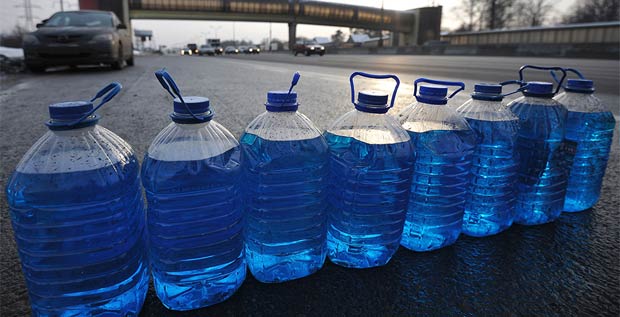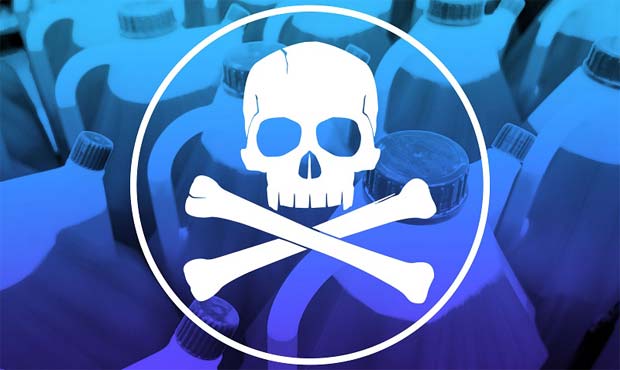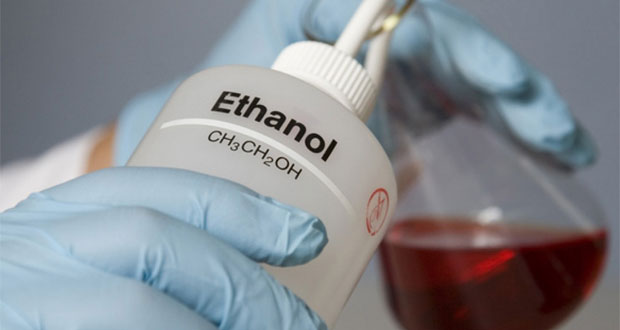
Antifreeze poisoning. Symptoms and first aid
Antifreeze is a coolant for a car engine. Having a water base, antifreeze contains liquid alcohols - ethylene glycol, propylene glycol and methanol, which are dangerous and poisonous when ingested by humans and animals. Even in small quantities.
Symptoms
Antifreeze can also be poisoned by accident by drinking a chemical containing the listed ingredients. This can happen when antifreeze is poured into a glass or other beverage container. Given this, it is important to recognize the symptoms of poisoning in a timely manner.
Antifreeze poisoning can occur gradually over several hours, so a person may not develop symptoms immediately after ingestion or vapor poisoning. But the situation is not so simple: as the body absorbs (or metabolizes) antifreeze, the chemical turns into other toxic substances - glycolic or glyoxylic acid, acetone and formaldehyde.


The time it takes for the first symptom to appear depends on the amount of antifreeze you drink. The earliest symptoms can develop from 30 minutes to 12 hours after ingestion, and the most severe symptoms begin about 12 hours after ingestion. The first symptoms of antifreeze poisoning may include intoxication. Among the others:
- Headache.
- Fatigue.
- Lack of coordination of movements.
- Slurred speech.
- Nausea and vomiting.
In some cases, there may be an increase in breathing, inability to urinate, an increased rapid heartbeat, and even convulsions. You can even lose consciousness and fall into a coma.
As the body digests the antifreeze over the next few hours, the chemical can affect the function of the kidneys, lungs, brain, and nervous system. Irreversible effects on the body can occur within 24-72 hours after ingestion.


First aid
First aid must be provided promptly. With the above symptoms, you should immediately wash the stomach of the victim and contact an ambulance. Stay with the victim until the ambulance arrives. Given his condition, it is necessary to remove all sharp objects, knives, medicines - everything that can be harmful. Psychological interaction is also important: you need to listen to someone who has been poisoned by antifreeze, but not to condemn, not to argue, not to threaten, and not to shout at him.
If you are at risk of suicide, you should promptly get help from a crisis or suicide prevention hotline.
Upon admission to the hospital, the doctor must be told:
- What substance did the person suffer from?
- Time when the accident happened.
- Approximate amount of antifreeze drunk.


The hospital will closely monitor the patient's condition. This is due to the fact that antifreeze can affect the body in various ways. The hospital will be able to check blood pressure, body temperature, breathing rate and heart rate. Various tests will also be performed to check the levels of chemicals in the blood as well as the functioning of vital organs.
An antidote is the first line of treatment for antifreeze poisoning. These include either fomepisol (Antisol) or ethanol. Both drugs can positively change the effects of poisoning and prevent the development of further problems.


Prevention Tips
Here are some prevention tips that can help and prevent poisoning:
- Do not pour antifreeze into water bottles or bottles designed for food liquids. Store the chemical only in the original packaging.
- If antifreeze is accidentally spilled during vehicle maintenance, the spill area should be thoroughly cleaned and then sprayed with water from above. This will help prevent pets from consuming the liquid.
- Always put a cap on the antifreeze container. Keep the chemical out of the reach of children and pets.
- As a precaution, you should not drink a drink whose composition is unknown to you. Never accept drinks from strangers.
With early intervention, the drug can significantly reduce the effects of antifreeze poisoning. In particular, treatment can prevent kidney failure, brain damage and other adverse changes, in particular for the lungs or heart. If the victim is not treated, then serious poisoning from the use of antifreeze can be fatal after 24-36 hours.


Watch this video on YouTube
